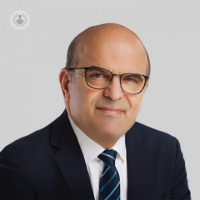Amyotrophic Lateral Sclerosis (ALS) / Motor Neurone Disease (MND): FAQ
Autore:Amyotrophic Lateral Sclerosis (ALS, MND) is a challenging and progressive neurodegenerative disease that affects thousands of people worldwide. Dr Adnan Al-Araji explains the disease, including symptoms and treatment.
What is ALS/MND?
ALS, which can also be referred to as Motor Neurone Disease (MND) or Lou Gehrig's disease, is a neurodegenerative disorder affecting the nerve cells responsible for controlling voluntary muscles.

What are the symptoms of Amyotrophic Lateral Sclerosis (ALS)?
ALS symptoms are diverse and progressive. Patients usually first begin to experience muscle twitching (fasciculations). They can start with weakness or stiffness, which results in difficulties in everyday activities such as walking, speaking, or grasping objects. As the disease progresses, muscles can begin to decrease in size and as a consequence, muscles get more twitches, patients can suffer from cramps and their motor functions can noticeably decline and some may also face challenges with swallowing or breathing. It is important to note that ALS/MND affects each person differently, and the rate of progression can vary significantly.
How is ALS diagnosed?
Diagnosing ALS can be complicated because its symptoms may overlap with those of other neurological conditions. In order to try and diagnose the condition, doctors carry out a comprehensive assessment of medical history, physical examinations, and various tests to make an accurate diagnosis. These tests may include an electromyography (EMG), which evaluates electrical activity in muscles, nerve conduction studies (NCS) which measure nerve function, and magnetic resonance imaging (MRI) to rule out other possible causes.
How is ALS treated?
Unfortunately, there is currently no cure for ALS. However, there are treatment options available which aim to manage symptoms, improve the patient’s quality of life and slow down the progression of the disease.
It can be managed through multidisciplinary care, consisting of a team of healthcare professionals, such as neurologists, physical and occupational therapists, speech-language pathologists, and nutritionists. This multidisciplinary approach is essential in order to provide comprehensive support.
Medications
Riluzole (Rilutek): Riluzole is the only medication approved by the National Institute for Health and Care Excellence (NICE) for the treatment of ALS. The medication has been proven to modestly extend survival and slow down disease progression in some people with ALS. It is usually prescribed to individuals with the disease to help delay the need for ventilation support.
Symptomatic Treatment
Healthcare professionals may prescribe medications which can deal with specific symptoms such as muscle cramps, excessive saliva production, or emotional changes such as depression or anxiety. These medications work to improve comfort and quality of life.
Therapies and Assistive Devices
Physical and occupational therapies can aid maintain muscle strength, improve mobility, and adapt to changes in daily activities. Speech therapy is an option which can aid in the management of communication difficulties. Assistive devices such as wheelchairs, braces, and communication aids can enhance independence and quality of life.
Respiratory Support
As ALS progresses, respiratory muscles weaken, which can potentially lead to breathing difficulties. Doctors may recommend non-invasive ventilation, such as bilevel positive airway pressure (BiPAP), to assist with breathing during sleep or more advanced stages of the disease.
Clinical Trials
Participating in clinical trials can provide access to experimental therapies and contribute to advancing ALS research. It is advisable to consult with healthcare professionals to determine eligibility and potential benefits.
Emotional Support
ALS can affect patients not only physically, but it can take an emotional toll on individuals and their families. Support groups, counselling, and resources offered by ALS associations can provide emotional support, guidance, and a sense of community.
Research and Future perspectives
Research on ALS has made significant progress in recent years, leading to a better understanding of the disease's genetic and molecular basis. Future perspectives include the development of biomarkers for early diagnosis, advancements in stem cell and gene therapies, modulation of neuroinflammation and immune response, and improvements in supportive care and symptom management. These advancements hold promise for improved diagnosis, treatment, and management of ALS in the future.
To schedule in an appointment with Dr Adnan Al-Araji head on over to his Top Doctors profile today


